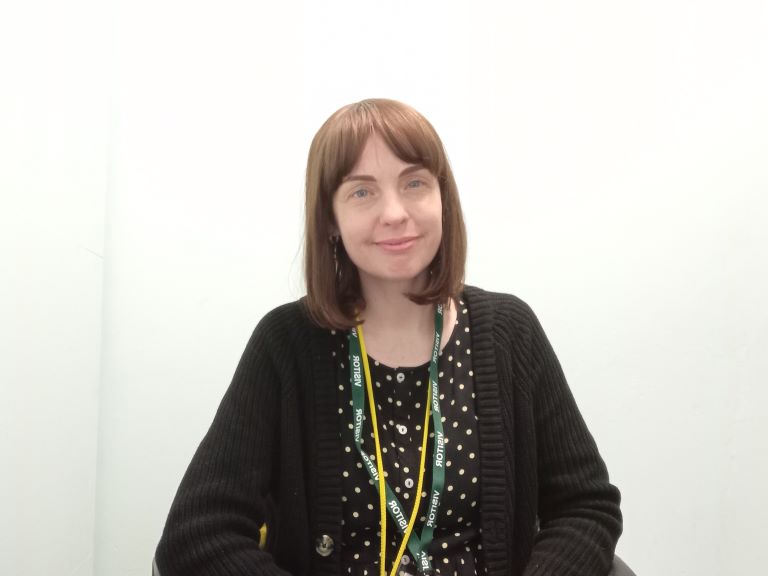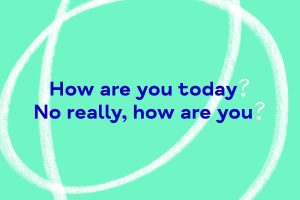A day in the life of a schools’ mental health practitioner… Nicola
16/02/2024

My name is Nicola and I support young people in secondary schools with their mental health. I have been working at Manchester Mind since 2022. A typical day in the life of my job looks like this:
8am: I set off on the bus for the school I am based in. As I work in different schools, I can usually be seen with a large backpack containing lots of the things I need for the day! I try to be really organised about this as my time is school is always busy.
8:20am: I arrive in school and sign in at the reception, before saying good morning to the team I liaise with; this is made up of the Mental Health Lead and Pupil Welfare workers. We spend some time checking in on any important updates about the young people I see and discussing referrals they might be considering. I’m then able to start setting up my room for the day. I really enjoy this part of the job. I’m fortunate to have a comfortable room, with blankets, cushions and plenty of space. It is important to me to provide a welcoming space for young people, many of whom will arrive feeling a little nervous about the sessions. I set up a basket of fidgets and grounding/soothing sensory objects for them to handle, some games designed to help with building connection, a small whiteboard and pen, and any informative worksheets we might use.
9am: My first young person arrives. He is in Year 7 and we have been meeting for around 3 sessions now. Most young people work with me for between 6-12 sessions in total. He has been having difficulties with the way he expresses his feelings of anger and is often being sent home from school for short-term exclusions. He is finding it hard to settle into secondary school and it is affecting his self-esteem. We spend some time catching up on his week and completing his wellbeing measure scores. It is really important for him to understand that anger is a normal, healthy emotion and we talk about that for some time. We are working towards exploring new, healthier ways of responding to it in our sessions. Today we talk about the main triggers for this young person’s anger and learn about how the brain reacts when it feels under threat. We look at the ways he has been responding to this so far and explore his hopes for making changes.
10am: I’m meeting my next young person for the first time today. He is in Year 11 and will be taking his GCSEs at the end of the school year. I welcome him to the space and I spend some time introducing myself, my role, the meaning of confidentiality and when things may need to be shared with another adult, the types of things we might do in the sessions and answer any questions he has. He explores the fidget basket as we speak and we then begin an ‘assessment’. This word can feel a little daunting so, whilst there is specific information I need to gather, I explain that we will be having a conversation, which will help me get to know him and the difficulties he is having at the moment. He tells me a little about his life and interests and we play a game of ‘conversation jenga’ to help us get to know each other more. He tells me that he has been feeling anxious in school for a long time as he is worried he will not do as well as expected on his GCSEs. I thank him for sharing and explain that there are things we can do together to help with this. He will come back next week to continue the assessment and make some goals to work towards.
Breaktime: I have time to type up my notes from sessions and respond to any emails I have received. I usually have a snack and a nice, calming cup of tea at this point in the day. It is really important I take care of my needs and my own mental health so that I can best support others.
11:30am: My next young person has had a difficult week at school and at home. They open up and tell me they have been struggling with thoughts of self-harm. This young person has bravely trusted me with these difficult feelings; I reassure them that they have done the right thing by talking to me about it and that we will work together to help them. They haven’t acted on these thoughts yet, so we focus on what has helped them stay safe so far. We work together to create a ‘safety plan’ to follow when experiencing these thoughts. We identify triggers for these thoughts, healthy distractions and calming methods, trusted people who they can speak to, how others can help and a safe place to go to. I make sure the young person has a copy of this plan and I talk through support lines, websites and apps they can access, and what to do if they still feel unsafe. I talk about how it could help if other trusted adults in the young person’s life knew about what they are experiencing and have a copy of the safety plan. They agree, but feel it is too difficult to tell anybody themselves. We decide to speak together to the school Mental Health Lead who is responsible for safeguarding. They will check on the young person throughout the next week until our next session. We will review the plan next week.
12:30pm: It is lunchtime at school. Four young people attend for a wellbeing group session. This is their fifth group session with me. They eat their lunch as we check in on their week, thinking about what has gone well, what has been challenging and what they are looking forward to. We usually play some calming music in the background, which they like to choose. We talk about the idea of all having a bucket of stress that can sometimes start to overflow. The group like this image. They write down on post-its the stressors young people face today and fill a bucket with them. We then think about healthy ways they can relieve this stress. They come up with lots of great ideas, including making a relaxing playlist, drawing in their sketchbooks and planning a meet up with friends to look forward to. We end the session with a relaxation/grounding activity called progressive muscle relaxation. This can feel a bit awkward for everybody at first as it’s not something they have tried before. I reassure them that it is normal to feel that way and we have a little giggle before carrying on. Everyone says they feel calmer afterwards and so I encourage them to try this activity when they next feel stressed.
Lunchtime: After the group I take my lunch break. I try to spend some time away from the room I work in as it helps to clear my head. Some days I have a little walk to the shop nearby, but today I go to the staffroom and enjoy another cup of tea with my food.
2pm: My final young person of the day arrives. She has been struggling with her feelings since her grandma died and is now finding it hard to attend and engage with school. We spend some time normalising how difficult it can be to return to previous routines and expectations when grieving and how important it is she shows herself self-compassion. I explain this means being kind and understanding towards herself the way she would to others. The young person finds it hard to leave the family home to attend school as that is where they feel closest to the memories of their grandma. We have been creating a small memory box for them to access in school, in the hope this can bridge the gap between home and school. Today we speak about the interests she and her grandma shared and write these down to keep in the box. We finish our session with some grounding exercises that the young person has been practising and found helpful.
3pm: It is the end of the school day. I spend time completing my notes and reflecting on the bravery and commitment the young people have all show by meeting and sharing with me today. It is an absolute privilege to support them.
Before I leave for the day, I check in with the Mental Health Lead and Pupil Welfare team. They have been very busy. We remind each other to spend some time relaxing this evening and showing ourselves the care we give to others.
